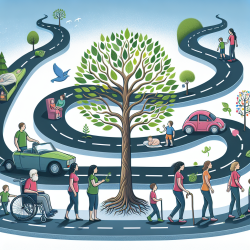Introduction
The transition from adolescence to adulthood can be a challenging period for families of individuals with autism and other developmental disabilities (DDs). The research article titled A Longitudinal Mixed-Methods Characterization of Family Support from Adolescence to Young Adulthood in Autism and Other Developmental Disabilities provides valuable insights into how family support evolves during this critical phase. As a practitioner, understanding these dynamics can enhance your ability to support families effectively.
Key Findings from the Research
The study utilized a mixed-methods approach to assess changes in family support over time, focusing on both formal and informal support systems. Here are some of the key findings:
- Informal Support Stability: Informal support from family members was consistently the most used and valued source of support. This remained relatively stable over time, highlighting the importance of family bonds.
- Decline in Formal Support: The use and perceived helpfulness of formal support systems, such as professional services and schools, declined as individuals transitioned into adulthood. This decline is often referred to as the "service cliff."
- Shift in Support Needs: Over time, there was a noticeable shift towards valuing emotional support over instrumental support, particularly for caregivers of less able adults. Partnership and dependability were identified as highly valued features of support sources.
Implications for Practitioners
As a practitioner, these findings can inform your approach to supporting families of individuals with autism and DDs:
- Emphasize Emotional Support: Encourage families to foster strong emotional connections and partnerships. This can be achieved through family counseling or support groups that focus on emotional resilience and understanding.
- Facilitate Informal Support Networks: Help families identify and strengthen their informal support networks. This might involve connecting them with local community groups or facilitating introductions to other families in similar situations.
- Advocate for Continued Formal Support: Work with educational and healthcare institutions to ensure that formal support systems remain accessible and adaptable as individuals transition to adulthood. This may involve advocating for policy changes or additional resources.
Encouraging Further Research
The study highlights the need for further research into the dynamics of family support, particularly in later adulthood. As a practitioner, you can contribute to this body of knowledge by documenting and sharing your observations and experiences with families. Collaborating with researchers can also provide valuable insights and help shape future support strategies.
Conclusion
Understanding the evolving nature of family support in autism and DDs is crucial for practitioners aiming to provide effective assistance. By emphasizing emotional support, facilitating informal networks, and advocating for sustained formal support, you can help families navigate the challenges of transitioning to adulthood.
To read the original research paper, please follow this link: A Longitudinal Mixed-Methods Characterization of Family Support from Adolescence to Young Adulthood in Autism and Other Developmental Disabilities.










